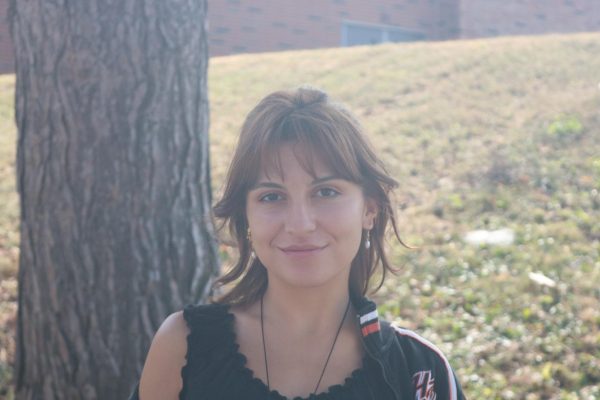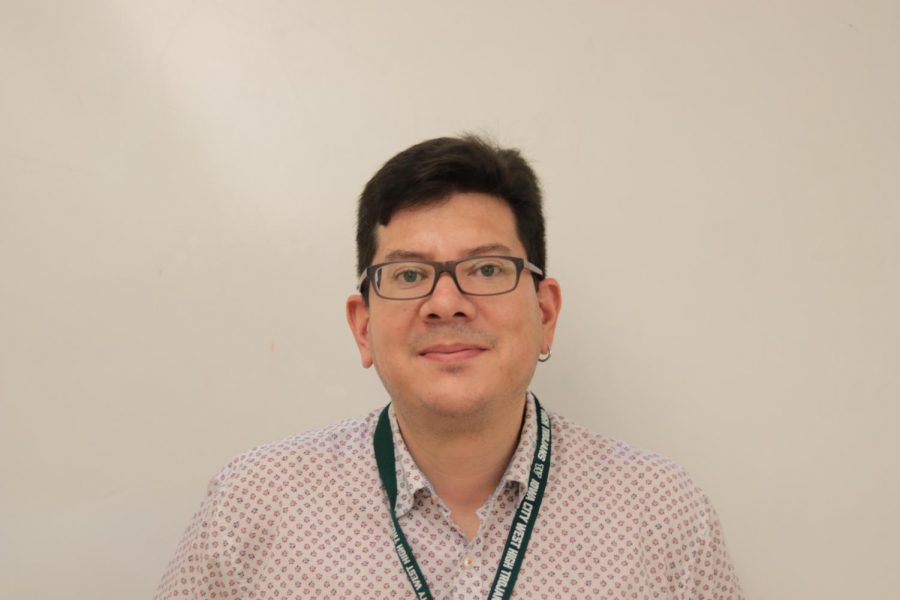Journey to West
Javier Montilla has been teaching for as long as he can remember, but not in the way he does now. Montilla shares his story of teaching music, traveling between countries and winding up at West.
After a journey full of trial and error, Spanish teacher Javier Montilla has found a home in Iowa City.
Spanish teacher Javier Montilla’s journey to teaching at West was long and uncertain. His love for creating engaging and energetic Spanish lessons stemmed from his background in music and performing, beginning when he was a child living in Venezuela.
When Montilla was seven, he began playing the flute in a publicly-funded music program called El Sistema. It was founded in 1975 by José Antonio Abreu, an economist, musician and congressman who Montilla described as a genius. El Sistema aims to get kids of all ages involved in music. Montilla described the program as a way to capture kids’ attention and give them an opportunity to learn when they might not have the money or resources to do it otherwise.
“If you are in the classical music field, it could be really expensive to pay for lessons, to pay for the instruments, to pay for anything. It is not like playing folk music,” Montilla said, strumming his cuatro, a Latin American string instrument. “If you’re going to play the clarinet, if you want to play the violin, if you want to play the harp, if you want to play even a trumpet, those are expensive instruments.”
Montilla worked hard to keep up with expectations from all areas of his life. He went to school from 7 a.m. to 1 p.m. then straight to music school until 9 p.m. However, the experience he gained was worth the very strict schedule.
“The beauty of it was that we were so motivated because of this style of teaching and the other music in that music program,” Montilla said. “It showed you so many interesting things like cooperation and working in teams, appreciation for music, appreciation for art.”
As he grew up in the program, Montilla was asked to help teach the kids coming into the program after him. He received his first paycheck for teaching when he was 13, but he wasn’t expecting to become a full-time teacher one day.
Montilla then moved to the Venezuelan city of Caracas to pursue a bachelor’s degree in flute performance, eventually playing professionally with the Venezuelan Symphony Orchestra. He also played in a group called Pabellón Sin Baranda, creating songs that were a fusion of classical and folk music with his two bandmates.
“It was so interesting and so new, because we were kind of crazy and challenging all the traditional things,” Montilla said.
In 2000, he came to the U.S. on a scholarship to receive his master’s degree at the University of Colorado. Montilla won two of the most important musical competitions and after getting his degree, returned home to Venezuela. However, his stay there didn’t last long as a friend recommended that Montilla apply for a scholarship in Lincoln, Nebraska to get his doctorate.
“It was really difficult to pursue a doctorate in any field, but in music it was a lot of reading, it was a lot of analyzing, it was a lot of getting into the deeper fabrics of understanding music,” Montilla said. “But it was really, really nice and it opened my mind in different ways.”
After completing his degree, Montilla once again returned back to Venezuela, this time for a longer stay. Montilla went back to teach at El Sistema, the music program he had played in when he was a child, and highly enjoyed the experience. He never planned on going abroad again until things started falling apart.
“The money I was making wasn’t enough to even buy food. There were lines to buy food [and a] shortage of electricity, water, even toilet paper, it was just crazy,” Montilla said. “So I said … ‘It’s a good time to go abroad’ because otherwise I’m going to be stuck here.”
When a friend from college offered Montilla a place to live, he decided to take the leap and move to Seattle, Washington. During his first year there, Montilla continued to play the flute and teach; however, it was not enough to make a living. So, he started teaching Spanish as a private tutor and eventually worked with a company to do tutoring before and after school.
“I have been teaching all my life, so it was like ‘Okay, now I’m not going to teach music, I’m going to teach something else, which is my native language,’” Montilla said.
After two years of tutoring, Montilla started to work on getting a teaching certificate so he could teach Spanish in schools. Though the process was challenging and time-consuming, leaving barely any time for Montilla to sleep, he got his certificate and taught in Seattle for another few years.
While many people emphasize the importance of learning a language because of its importance in education, communication and traveling, Montilla encourages it because of the feeling of saying words in a new way.
“When you say amar, to love, and you say that in your own native language … it means something that you have felt so many times in different circumstances,” Montilla said. “When you have to say it in a different language … you get to feel things with a different set of words but they are not just words, it’s complete feelings.”
After navigating online teaching during the pandemic, Montilla decided yet again to move, this time to join his brother and live in Iowa City. Even though he only moved here a few weeks prior to the start of school, he is happy to have made the move.
“I enjoy spending time with my family,” Montilla said. “And to find that time again saying ‘I’m going to enjoy this and I’m going to forget about anything else’ like, for example, reading a good book, or listening to music, or just having a good conversation without having the pressure of what’s coming next.”
While teaching at West, he hopes to continue to create engaging lessons that get students excited and motivate them to learn the same way music school had for him.
“Every day, I’m thinking ‘How can I make it exciting? How can I make it worthy? How can I make it so I’m not fighting with the cell phones that students are using because they’re so engaged with what is going on?’” Montilla said. “When I can see that other people are enjoying [themselves] and have this spark in their eyes, that’s what moves me.”
Your donation will support the student journalists of West High School. Your contribution will allow us to purchase Scholarship Yearbooks, newsroom equipment and cover our annual website hosting costs.

(they/them) Katherine Shoppa is a senior in high school and this is their third year on staff. They are the Co-Editor-in-Chief of the...

(she/her) Zaira Ahmad is a Senior at West High. This is her third year on staff, and she is the Print Editor-In-Chief. Outside of the newsroom, you can...

(they/she) Defne Bayman is a senior this year, and has been on Print for two years and joined Web this year. They are the communications manager for all...



